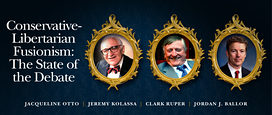Lead Essay
Jacqueline Otto emphasizes that libertarians and conservatives share the goal of a more market-oriented economic system. That system can be ours, she argues, but only if we work together. As a result, she criticizes what she calls “the practice of keeping separate encampments.” She stresses the individualist and voluntary character of the Christian faith, which she sees as a proper complement to a market order. She warns that should we fail to emphasize the morality of capitalism, those on the religious left will be happy to dismantle it for us.
Response Essays
Jeremy Kolassa argues that fusion with traditional American conservatism has failed. The divide on social issues is simply too deep. Even in economics, conservatives have tended to be pro-business rather than pro-market. When voters see special favors for corporations being touted as free-market solutions, they lose interest in markets as a policy. That makes market advocates’ jobs so much harder. The unequal treaty needs to end, and libertarians need to assert an independent political identity.
Clark Ruper reviews the history of fusionism, including the growth of independent libertarian institutions that don’t have to depend on the conservative movement anymore. Young people nowadays aren’t moving left, he argues. They are simply moving away from conservatism. The fusionist project is dead, and conservatives killed it.
Jordan Ballor argues that the libertarian exaltation of political liberty is dangerous: By privileging the power of the state, this worldview both gives the state too much importance and also undervalues the independent institutions of civil society. In reality, these institutions are bulwarks against the state. They represent the happy medium between atomistic individualism and Rousseauan collectivism. He ends with a plea for Burkean conservatism as the best way of constraining the statist/collectivist impulse.
The Conversation
Related at Cato
- Cato Unbound: “Should Libertarians Vote Democrat?” October, 2006, with Markos Moulitsas
- Policy Analysis: ”The Libertarian Vote” by David Boaz and David Kirby
- Policy Analysis: ”The Libertarian Vote in the Age of Obama” by David Boaz and David Kirby

